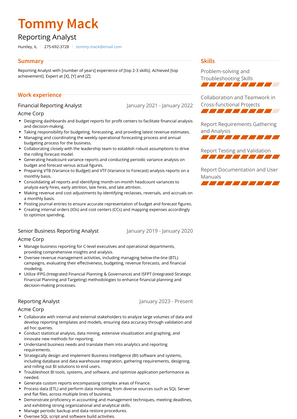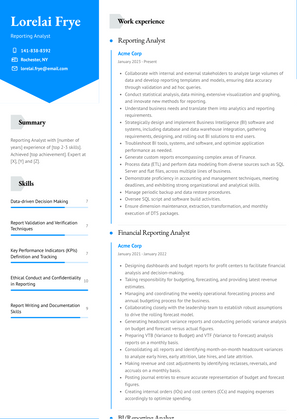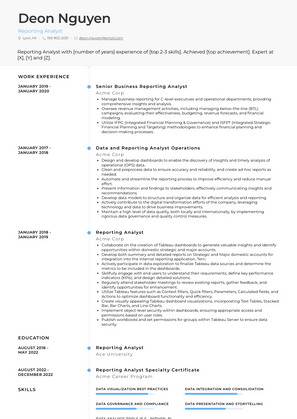3+ Reporting Analyst Resume Examples and Templates
This page provides you with Reporting Analyst resume samples to use to create your own resume with our easy-to-use resume builder. Below you'll find our how-to section that will guide you through each section of a Reporting Analyst resume.



What Do Hiring Managers Look for in a Reporting Analyst Resume
- Strong analytical skills: Possesses advanced data analysis skills to gather, organize, and analyze complex datasets to generate meaningful insights and reports.
- Proficiency in reporting tools: Demonstrates expertise in using reporting tools and software, such as SQL, Excel, Power BI, or Tableau, to create visually appealing and informative reports.
- Attention to detail: Pays close attention to accuracy and precision when handling data, ensuring that reports are error-free and reliable.
- Communication skills: Effectively communicates findings and analysis through clear and concise reports, presentations, and visualizations, making complex information accessible to stakeholders.
- Problem-solving ability: Identifies and resolves data-related issues or discrepancies, utilizing problem-solving skills to improve reporting processes and efficiency.
How to Write a Reporting Analyst Resume?
To write a professional Reporting Analyst resume, follow these steps:
- Select the right Reporting Analyst resume template.
- Write a professional summary at the top explaining your Reporting Analyst’s experience and achievements.
- Follow the STAR method while writing your Reporting Analyst resume’s work experience. Show what you were responsible for and what you achieved as a Reporting Analyst.
- List your top Reporting Analyst skills in a separate skills section.
How to Write Your Reporting Analyst Resume Header?
Write the perfect Reporting Analyst resume header by:
- Adding your full name at the top of the header.
- Add a photo to your resume if you are applying for jobs outside of the US. For applying to jobs within the US, avoid adding photo to your resume header.
- Add your current Reporting Analyst to the header to show relevance.
- Add your current city, your phone number and a professional email address.
- Finally, add a link to your portfolio to the Reporting Analyst resume header. If there’s no portfolio link to add, consider adding a link to your LinkedIn profile instead.
Bad Reporting Analyst Resume Example - Header Section
Marques 696 Rock Maple St. South Lyon, MI 48178 Marital Status: Married, email: cooldude2022@gmail.com
Good Reporting Analyst Resume Example - Header Section
Marques Branch, Lyon, MI, Phone number: +1-555-555-5555, Link: linkedin/in/johndoe
Make sure to add a professional looking email address while writing your resume header. Let’s assume your name is John Doe - here is a formula you can use to create email addresses:
- firstnamelastname@email.com - johndoe@email.com
- firstname.lastname@email.com - john.doe@email.com
- lastname.firstname@email.com - doe.john@email.com
- f.lastname@email.com - j.doe@email.com
- l.firstname@email.com - d.john@email.com
- firstnamelastname12@email.com - johndoe12@email.com
For a Reporting Analyst email, we recommend you either go with a custom domain name (john@johndoe.com) or select a very reputed email provider (Gmail or Outlook).
How to Write a Professional Reporting Analyst Resume Summary?
Use this template to write the best Reporting Analyst resume summary: Reporting Analyst with [number of years] experience of [top 2-3 skills]. Achieved [top achievement]. Expert at [X], [Y] and [Z].
How to Write a Reporting Analyst Resume Experience Section?
Here’s how you can write a job winning Reporting Analyst resume experience section:
- Write your Reporting Analyst work experience in a reverse chronological order.
- Use bullets instead of paragraphs to explain your Reporting Analyst work experience.
- While describing your work experience focus on highlighting what you did and the impact you made (you can use numbers to describe your success as a Reporting Analyst).
- Use action verbs in your bullet points.
Reporting Analyst Resume Example
Reporting Analyst
- Collaborate with internal and external stakeholders to analyze large volumes of data and develop reporting templates and models, ensuring data accuracy through validation and ad hoc queries.
- Conduct statistical analysis, data mining, extensive visualization and graphing, and innovate new methods for reporting.
- Understand business needs and translate them into analytics and reporting requirements.
- Strategically design and implement Business Intelligence (BI) software and systems, including database and data warehouse integration, gathering requirements, designing, and rolling out BI solutions to end users.
- Troubleshoot BI tools, systems, and software, and optimize application performance as needed.
- Generate custom reports encompassing complex areas of Finance.
- Process data (ETL) and perform data modeling from diverse sources such as SQL Server and flat files, across multiple lines of business.
- Demonstrate proficiency in accounting and management techniques, meeting deadlines, and exhibiting strong organizational and analytical skills.
- Manage periodic backup and data restore procedures.
- Oversee SQL script and software build activities.
- Ensure dimension maintenance, extraction, transformation, and monthly execution of DTS packages.
Financial Reporting Analyst Resume Example
Financial Reporting Analyst
- Prepared bank reconciliations, accounts payables/receivables reconciliations, and other financial reconciliations to facilitate the preparation of year-end financial statements, cash flows, and notes to financial statements.
- Conducted analysis of financial systems to identify areas for improvement and optimize processes.
- Assisted in performing horizontal and vertical analysis of income statement and balance sheet accounts during review engagements, identifying discrepancies for further investigation and testing.
- Designed and formatted various reports to present financial information effectively and clearly.
Financial Reporting Analyst Resume Example
Financial Reporting Analyst
- Designing dashboards and budget reports for profit centers to facilitate financial analysis and decision-making.
- Taking responsibility for budgeting, forecasting, and providing latest revenue estimates.
- Managing and coordinating the weekly operational forecasting process and annual budgeting process for the business.
- Collaborating closely with the leadership team to establish robust assumptions to drive the rolling forecast model.
- Generating headcount variance reports and conducting periodic variance analysis on budget and forecast versus actual figures.
- Preparing VTB (Variance to Budget) and VTF (Variance to Forecast) analysis reports on a monthly basis.
- Consolidating all reports and identifying month-on-month headcount variances to analyze early hires, early attrition, late hires, and late attrition.
- Making revenue and cost adjustments by identifying reclasses, reversals, and accruals on a monthly basis.
- Posting journal entries to ensure accurate representation of budget and forecast figures.
- Creating internal orders (IOs) and cost centers (CCs) and mapping expenses accordingly to optimize spending.
Financial Reporting Analyst Resume Example
Financial Reporting Analyst
- Prepare and report daily Profit and Loss (P&L) statements to the Front Office and Senior Management.
- Assist in executing month-end controls to ensure that management versus financial P&L variances are within acceptable thresholds.
- Perform front-to-back analysis and reconciliations of front office P&L and balance sheet to firm sub-ledgers.
- Collaborate with regulatory change and project teams, taking a proactive role in leading strategic changes.
- Review regulatory reports on a monthly, quarterly, and annual basis to ensure compliance with regulations.
- Contribute to efficiency and capacity-building initiatives, including efforts to automate and standardize processes.
- Work within a high-tech environment, utilizing tools such as SAP, Alteryx, Oracle, and Tableau.
Senior Business Reporting Analyst Resume Example
Senior Business Reporting Analyst
- Manage business reporting for C-level executives and operational departments, providing comprehensive insights and analysis.
- Oversee revenue management activities, including managing below-the-line (BTL) campaigns, evaluating their effectiveness, budgeting, revenue forecasts, and financial modeling.
- Utilize IFPG (Integrated Financial Planning & Governance) and ISFPT (Integrated Strategic Financial Planning and Targeting) methodologies to enhance financial planning and decision-making processes.
Reporting Analyst Resume Example
Reporting Analyst
- Collaborate on the creation of Tableau dashboards to generate valuable insights and identify opportunities within domestic strategic and major accounts.
- Develop both summary and detailed reports on Strategic and Major domestic accounts for integration into the internal reporting application, Terri.
- Actively participate in data exploration to finalize Tableau data sources and determine the metrics to be included in the dashboards.
- Skillfully engage with end users to understand their requirements, define key performance indicators (KPIs), and design detailed solutions.
- Regularly attend stakeholder meetings to review existing reports, gather feedback, and identify opportunities for enhancement.
- Utilize Tableau features such as Context filters, Quick filters, Parameters, Calculated fields, and Actions to optimize dashboard functionality and efficiency.
- Create visually appealing Tableau dashboard visualizations, incorporating Text Tables, Stacked Bar, Bar Charts, and Line Charts.
- Implement object-level security within dashboards, ensuring appropriate access and permissions based on user roles.
- Publish workbooks and set permissions for groups within Tableau Server to ensure data security.
Data and Reporting Analyst Operations Resume Example
Data and Reporting Analyst Operations
- Design and develop dashboards to enable the discovery of insights and timely analysis of operational (OPS) data.
- Clean and preprocess data to ensure accuracy and reliability, and create ad-hoc reports as needed.
- Automate and streamline the reporting process to improve efficiency and reduce manual effort.
- Present information and findings to stakeholders, effectively communicating insights and recommendations.
- Develop data models to structure and organize data for efficient analysis and reporting.
- Actively contribute to the digital transformation efforts of the company, leveraging technology and data to drive business improvements.
- Maintain a high level of data quality, both locally and internationally, by implementing rigorous data governance and quality control measures.
Reporting Analyst Resume Example
Reporting Analyst
- Prepare management information system (MIS) reports for clients, providing them with comprehensive insights and analysis.
- Train new team members on the process and ensure they are equipped with the necessary knowledge and skills.
- Communicate with clients to provide information regarding their expenses and savings, addressing any inquiries or concerns they may have.
- Analyze reports and prepare presentations to effectively communicate key findings and recommendations.
- Prepare request for quotation (RFQ) documents tailored to meet clients' specific needs and requirements.
- Review and verify all necessary documents for policy renewals.
- Conduct weekly meetings with support managers to ensure alignment and address any operational issues or challenges.
- Prepare necessary paperwork and documentation for clients, ensuring accuracy and compliance.
BI/Reporting Analyst Resume Example
BI/Reporting Analyst
- Collaborated closely with stakeholders and solution architects to define business problem specifications and conducted complex data analyses to deliver effective business solutions.
- Conducted extensive data analyses, including data extraction, loading, transformation (ETL), and data modeling, while building front-end solutions such as reports, dashboards, and cubes.
- Provided solutions for data migration, including mapping data between legacy and current systems and developing strategies for staged roll-out.
- Designed interactive dashboards to facilitate sales growth and enhance order estimates, providing actionable insights for decision-making.
Administrative Reporting Analyst Resume Example
Administrative Reporting Analyst
- Utilize Excel functionalities such as pivot tables, formulas, and graphs to analyze data and generate insights.
- Regularly update daily, weekly, and monthly reports, including metrics such as the number of processed orders, additional sales percentage, sales speed, and sales performance.
- Conduct sales analysis year-over-year (YTY) and forecast short-term sales to identify trends and make informed decisions.
- Develop optimal employee schedules and calculate the required number of employees for upcoming weeks or months.
- Analyze the payback period and profitability of new and existing company products.
- Create a motivation system and calculate key performance indicators (KPIs) to drive employee performance and track progress towards goals.
Reporting Analyst Resume Example
Reporting Analyst
- Adapted existing processes into current technological standards.
- Strategized pilot programs for multiple change processes.
- Created and maintained multiple automated dashboards and KPI reports.
- Provided actionable data to drive business goals for Operation teams.
Senior Data Reporting Analyst Resume Example
Senior Data Reporting Analyst
- Developed integrated spreadsheet and database templates to efficiently collect, format, and organize program data, and presented findings to management.
- Conducted data analysis by reviewing computer reports, printouts, and performance indicators, and performed data transformation and analysis.
- Utilized SQL queries to retrieve data from databases and provided technical support for database-related issues to the Reporting Team.
- Executed Data Transformation Services (DTS) packages and scheduled jobs for data transformation processes, while also monitoring and tracking DTS packages.
- Designed and published various reports for call centers, catering to client needs and requirements.
- Managed resource augmentation, conducted training sessions, prepared time utilization reports, and delivered dependency reports for project deliverables.
- Extracted data from different sources and loaded it into staging tables, extensively working with source analyzer, target designer, transformation developer, mapping, and mapplet designer.
Top Reporting Analyst Resume Skills for 2023
- Data Analysis and Interpretation
- Report Development and Design
- Data Visualization and Dashboard Creation
- SQL (Structured Query Language) Proficiency
- Data Extraction and Manipulation
- Data Modeling and Database Design
- Advanced Excel Skills (e.g., PivotTables, VLOOKUP)
- Business Intelligence Tools (e.g., Tableau, Power BI)
- Data Warehousing Concepts
- ETL (Extract, Transform, Load) Processes
- Data Quality Assurance and Validation
- Report Automation and Optimization
- Statistical Analysis and Techniques
- Data Mining and Pattern Recognition
- Report Performance Tuning
- Key Performance Indicators (KPIs) Definition and Tracking
- Data Governance and Compliance
- Data Visualization Best Practices
- Data Analysis Tools (e.g., Python, R)
- Report Documentation and User Manuals
- Report Testing and Validation
- Data-driven Decision Making
- Predictive Analytics and Forecasting
- Data Privacy and Security Compliance
- Dashboard Development and Maintenance
- Report Deployment and Distribution
- Report Customization and Tailoring
- Data Integration and Consolidation
- Report Automation Tools (e.g., SSRS, Crystal Reports)
- Data Presentation and Storytelling
- Business Process Improvement Insights
- Report Performance Monitoring and Optimization
- Data Cleansing and Data Quality Management
- Data Analysis Techniques (e.g., Regression, Clustering)
- Report Query Optimization
- Data Visualization Libraries (e.g., D3.js, Matplotlib)
- Report Writing and Documentation Skills
- Report Requirements Gathering and Analysis
- Continuous Learning and Staying Updated with Reporting Tools
- Professionalism and Effective Communication Skills
- Ethical Conduct and Confidentiality in Reporting
- Collaboration and Teamwork in Cross-functional Projects
- Report Validation and Verification Techniques
- Adherence to Reporting Standards and Best Practices
- Report Governance and Audit Compliance
- Problem-solving and Troubleshooting Skills
- Critical Thinking and Analytical Skills
- Data Analysis Reporting Techniques
How Long Should my Reporting Analyst Resume be?
Your Reporting Analyst resume length should be less than one or two pages maximum. Unless you have more than 25 years of experience, any resume that’s more than two pages would appear to be too long and risk getting rejected.
On an average, for Reporting Analyst, we see most resumes have a length of 2. And, that’s why we advise you to keep the resume length appropriate to not get rejected.
Frequently Asked Questions (FAQs) for Reporting Analyst Resume
-
What does a Reporting Analyst do?
- A Reporting Analyst is responsible for gathering, analyzing, and interpreting data to generate reports and provide insights to support decision-making within an organization. They design and develop reporting solutions, automate data processes, and ensure data accuracy and integrity.
-
What qualifications are important for a Reporting Analyst position?
- Qualifications typically include a bachelor's degree in business, finance, mathematics, statistics, computer science, or a related field. Proficiency in data analysis tools such as SQL, Excel, Tableau, or Power BI, as well as experience with reporting software and database management systems, is essential.
-
What kind of experience should a Reporting Analyst highlight on their resume?
- Experience in data analysis, report generation, dashboard development, and data visualization techniques is crucial for a Reporting Analyst. Highlighting proficiency in querying databases, manipulating large datasets, and presenting findings to stakeholders is important.
-
How important is it for a Reporting Analyst to demonstrate analytical skills on their resume?
- Analytical skills are vital for a Reporting Analyst as they analyze complex data sets to extract meaningful insights and identify trends. Highlighting experience in data modeling, trend analysis, forecasting, and predictive analytics can demonstrate strong analytical abilities.
-
Should a Reporting Analyst include their experience with dashboard development on their resume?
- Yes, mentioning experience with dashboard development, including designing interactive dashboards, creating data visualizations, and customizing reports for specific business needs, can demonstrate the Analyst's ability to communicate data effectively to stakeholders.
-
What soft skills are important for a Reporting Analyst to highlight on their resume?
- Soft skills such as communication, problem-solving, attention to detail, critical thinking, adaptability, and time management are crucial for a Reporting Analyst. These skills contribute to effectively translating data into actionable insights and collaborating with cross-functional teams.
-
Is it necessary for a Reporting Analyst to mention their experience with data governance and quality assurance on their resume?
- Yes, mentioning experience with data governance practices, data quality assurance processes, and data validation techniques can demonstrate the Analyst's commitment to ensuring data accuracy, consistency, and reliability in reporting activities.
-
How should a Reporting Analyst tailor their resume for different industries or functional areas?
- A Reporting Analyst should highlight experience and skills relevant to the specific industries or functional areas they have worked in, whether it's finance, marketing, healthcare, or operations. Emphasizing familiarity with industry-specific metrics, reporting requirements, and regulatory standards can be beneficial.
-
Should a Reporting Analyst include their educational background on their resume?
- Yes, including educational background such as degrees, certifications, or relevant coursework in data analysis, business intelligence, or related fields is important. This provides credibility and demonstrates the foundational knowledge necessary for the role.
-
How can a Reporting Analyst make their resume visually appealing and easy to read?
- Utilizing clear headings, bullet points to highlight key skills and experiences, and a professional layout are important aspects of resume formatting. Additionally, including specific examples of reporting projects completed, improvements implemented, or any relevant achievements or recognitions can enhance the overall presentation of the resume.
Copyright ©2025 Workstory Inc.
